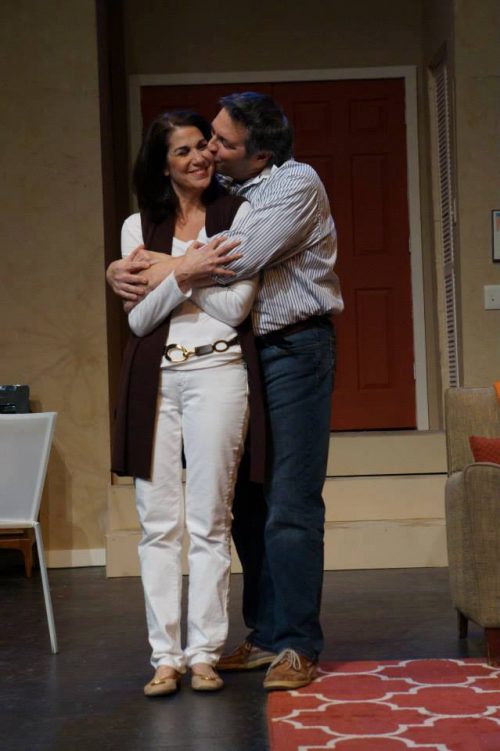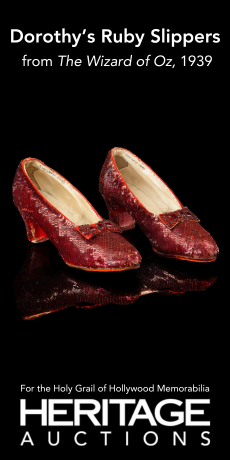
BY JUDY CARMACK BROSS
After a 20-year hiatus from acting, letting the spotlight shine on her corporate career instead, actress Julie Stevens is now back at center stage in two independent films shooting in Chicago this summer. Julie, who compares the world of independent movies to local theatre—both grassroots combinations of business and community—says that movie making in Chicago is a treat.
Her film career debuts with Ginger by Jimmy and Melissa Boratyn, a moving memoir slated to appear in film festivals in early 2018.
Julie will soon be shooting Phil on location in Lincoln Park, Wicker Park, and Pilsen, which is, according to its director, Marissa Lessman, “a comedy with a heart.”
Of auditioning for Phil, Julie related:
“Marissa had asked that actors send in videos in addition to participating in auditions. She contacted me about playing the Jewish mother of a gay son.
“I received her message at a time when my gay son was marrying his husband at a castle in Ireland. I had to tell her that I was too busy at that time to make a video, but my son had shot something hilarious about our relationship on YouTube, and I knew I understood the part. Marissa said it was perfect.”
When Julie returned to her stage career in 2015, she played another important mother.
“The Citadel Theater in Lake Forest timed its production of Ordinary People to coincide with the 35th anniversary of the movie entirely shot there. I was cast in the Mary Tyler Moore role. That movie really belongs to Lake Forest, and all sorts of special events were planned, including a bus tour of set locations.
“The Lake Forest-Lake Bluff Historical Society donated marvelous photos of the stars—Robert Redford, Mary Tyler Moore, Tim Hutton and Donald Sutherland—for the lobby.
“One attendee said that he had been an extra in the movie and still receives a residual check for $35 each year. Mine was a coveted role but not easy to portray.
“Right now I am enjoying being both in the theatre and the movies.”
Classic Chicago sat down with Marissa Lessman and Jimmy Boratyn, to learn about their movies and what its like to make indie films in Chicago.
Ginger co-creators, husband and wife duo Jimmy and Melissa Boratyn, met at film school at Loyola. He recounts those early days of dating:
“While we were still dating, I posed the idea of starting a video and production company, and she was on board from the start. We spent the early years building clients like any other new company. We were fortunate to find a niche in web-based video marketing and began working with universities, restaurants, and other organizations for 6 years.
“When Melissa was 23, she was diagnosed with breast cancer. The experience for both of us ended up giving us the idea to make our second feature film, Ginger. It is a feature-length dark comedy about what it is like being 23 and going through breast cancer. Our tagline is: “A 23-year-old’s pretty funny, slightly sad, powerfully emotional guide to breast cancer.”
“This was a passionate project for us and we opted to film it last summer as we’re both in graduate school, and that offered us the resources to shoot the film. Unfortunately, Melissa’s breast cancer returned.
“We actually got the news while we were holding our casting calls. I remember vividly location scouting and getting a text that her cancer was back. After some reflection, we decided to move forward, but the script changed fairly drastically taking on a bit of the voice of a person who both beat cancer and was currently fighting cancer.
“We filmed concurrently with her chemo treatment, which was difficult, but it was a film we needed to make. We are currently finalizing the cut, and we hope to enter it in several film festivals.”
Julie plays the role of a person interviewing Ginger for a job, and even though hers is the last scene of the movie, she arrived for each read-through beginning on page 1, even though Jimmy told her she could wait until her scene came on page 100.
To Julie, her first film was an important story to tell.
“Everyone involved did a very professional job, but our hearts are involved in the story as well. I think there was an extra level of commitment from the great actors in the film because of the story. Ginger is clearly a drama with several moments of irony and a very uplifting spirit.
“Being in the last scene, I may get to have the last word in the movie, and I always like having the last word.”
Marissa Lessman describes Phil as a love story with a message.
“Phil was the brainchild of my first year of graduate school. I was thinking about relationships and what happens to the memories and experiences once a long relationship ends. Where do these things go? I thought further about what would happen if you were ‘haunted’ by past experiences—almost like Eternal Sunshine of the Spotless Mind, but without the ability to erase.
“Phil was born, for lack of a better word, out of these connected ideas. It is the physical manifestation of the central couple’s shared history.
“My dreams for it are for audiences to resonate with the feelings of loss, longing, and ultimately strength. I would love for different demographics of people to laugh and learn a bit about themselves—to think of this movie as a love story with a message.”
Multitalented Marissa is an actress, comedian, and a writer, Jimmy a commercial and indie filmmaker with a movie he worked on now showing at the Vampire Film and Arts Fest in Transylvania.
In recent years his commercial work has taken him to Florence, San Jose, London, and Botswana, with Amsterdam and India on his fall schedule. His work closer to home is sensational as well.
Here’s what they say about filming in Chicago:
Marissa: The film community works hard and works smart. The talent that I have come across being a part of this community is unlike any I found when I was working in Los Angeles. There is a serene semblance of humility alongside a tenacious work ethic.
Amazing work is made constantly in Chicago, but the kicker is that so many of these brilliant filmmakers are not the ones to boast.
Being an independent filmmaker in Chicago is particularly special because there are so many people that want to be involved, but so many projects that lack in funding. There are plenty of arts advocates willing to help, but since so many of Chicago’s budding artists pick up and move to one of the coasts, the funding and momentum they once craved starts to fizzle out.
I personally love being a filmmaker here because of the work ethic, camaraderie, and passion for, as one of my favorite people Michael McCarthy says, ‘Heart over big jokes.’
Jimmy: Chicago is so incredible for filmmakers. There are some great resources here with the film offices and a huge network of filmmakers, but I think more than anything, Chicagoans love seeing films get made here.
Whenever I pull out a camera, I always have people who pop up to see what we are working on. They are so supportive, and you really feel like you are doing something people care about. Similarly, when we extend Chicago into its suburbs, you really have a large variety of settings.
It’s always my goal to film parts of my films from an angle in Chicago that isn’t seen frequently. I love working in Rogers Park, where I lived for 8 years, and in Albany Park, where I now live.
The incredible talent of the improv community here also makes Chicago a great place for making movies. Working with improvisers is exciting because we have a script we’ve been polishing for months or even years and, depending on whom we cast, the script can change drastically. It makes casting even more vital than it already was. It also drives my producers crazy, but they are an ok lot.
Classic Chicago: Jimmy, this is intriguing. Give us an example.
J: My first feature film, The Giggles, was actually a fully-improvised mockumentary. It was similar to a micro-budget version of Best in Show but following a group, The Giggles, who are trying, poorly, to become the next big children’s entertainment group, similar to The Wiggles or Mr. Rogers.
One time, we rented a projector and folding chairs and showed it to a full house in a friend’s basement in Rogers Park. Everyone had a great time, and we got excellent feedback. Our shorts generally end up on the web and The Giggles should be put up on Amazon to stream soon.
CC: Marissa, tell us how you got started.
M: I come from a television and playwriting background and have been published throughout the US, with plays done in California. I started acting and singing at a young age. Up until I was 20, all I wanted to do was be an actor.
After I received my undergraduate degree, I quickly came to realize that I could display my point of view better through writing. I then dove headfirst into playwriting and worked with many amazing mentors and teachers who encouraged me and helped me focus.
I moved to Los Angeles and quickly became obsessed with television and comedy and began to write pilots. From there, I moved to Chicago to attend graduate school at DePaul.
I have written several original pilots, a feature film, and several scripts based on existing shows. I’ve produced pilots, short films, and web series in Chicago and now am taking on the endeavor of a feature. Wish me luck!
CC: Jimmy, tell us how you got started and a little about your indie movies.
J: I went the academic route, not necessarily the way all filmmakers go. I studied film production and theory as an undergrad at Loyola, and now I am finishing up my thesis film in DePaul’s MFA in Directing program.
I still get together with one of my former professors, Jeff Harder, to discuss trends and technology. I have the contact information for many of my DePaul faculty, whom I call on if I hit a roadblock. In fact, Jeff worked with us on Ginger, and my wife and I helped him on his last feature film, Camilla, the black and white vampire film.
I like to work on character-driven films. Anything that covers the human condition is something I think works great in my films. That said, I think you can do anything in an indie. Why not?
We’ve had some success with films we have worked on in festivals around the world, including Transvlania for Camilla.
Actress Julie Stevens relishes this unexpected turn in her career and hopes for more indie opportunities with terrific Chicago filmmakers like Marissa, Jimmy, and Melissa: “This is such a welcoming world—I feel like Chicago’s proudest daughter.”

















